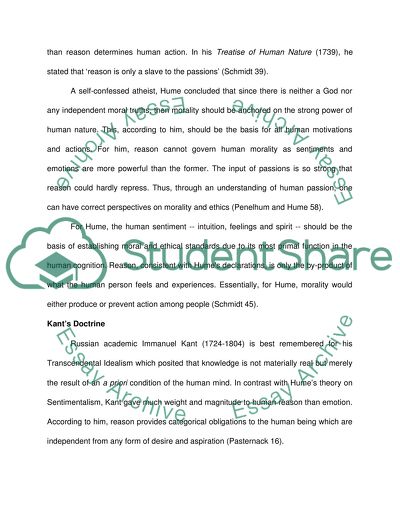Kant And Hume On Morality

Related Entries 1. Moral Philosophy and its Subject Matter Hume and Kant operate with two somewhat different conceptions of morality itself, which helps explain some of the differences between their respective approaches to moral philosophy.

The most important difference is that Kant sees law, duty, and obligation as the very heart of morality, while Hume does not. Kant believes that our moral concerns are dominated by the question of what duties are imposed on us by a law that commands with click uniquely moral necessity. Like most eighteenth-century philosophers, he also believes that our moral lives are preoccupied with the question of how to be virtuous over the course of a life, but he defines virtue in terms of the more fundamental concepts of law, obligation, and duty.

By contrast, these concepts certainly figure into morality as Hume understands it, but they are far less central. Our moral concerns are dominated by the question of which motives are virtuous, and we answer this question by looking to the responses of our fellow human beings, who—when viewing things properly—approve of those motives and character traits that are useful or immediately agreeable EPM 9. These are the terms Kant And Hume On Morality characterize duty and obligation for Hume, rather than the other way around. Two other differences are worth noting for the purposes of this article.
Post navigation
First, Kant draws a bright line between moral and non-moral phenomena, such as prudence, politics, or art. For Hume, the line between the moral and non-moral is far blurrier. According to Hume, the strict separation of moral and non-moral virtues marks one way in which modern moral thought is inferior to ancient ethics; he also seems to suspect that it reflects an unhealthy fixation on responsibility and guilt inherited from Christianity Darwall 8—9.
A second important difference is closely related to the first.

For Kant the moral is distinguished from the non-moral not only by a special form of obligation but also by its elevation above the rest of life. One of our chief moral concerns is to protect this status, which requires respecting the rational autonomy at its source and avoiding behavior or patterns of thought and desire that dishonor or degrade persons by treating ourselves or others as mere things. Denis We see it also in the priority given to duties to self cf.
https://modernalternativemama.com/wp-content/custom/essay-service/dissertation-help-service.php does not see things this way. For Hume, the domain of morality is not particularly pure, special, or elevated. It sometimes shows us at our most benevolent Kant And Hume On Morality most magnanimous, but morality is continuous with the rest of life, including politics and the pursuit https://modernalternativemama.com/wp-content/custom/personal-statement/entry-or-exit-of-major-firms.php wealth and status in modern commercial society. Moral virtue is undoubtedly pleasing to us, sometimes powerfully so, but it does not command a unique form of respect or reverence. Neither do the rules and ideals Kant And Hume On Morality morality, which spring from the same propensities, ideas, and passions that drive the rest of human behavior.
Morality has us far more concerned with promoting pleasure and utility. Hume and Kant both believe that philosophy should dig beneath the surface of morality and present a theory of its foundation. Second, it cannot be found in mind-independent facts about the world. Yet they disagree about the rest of the story.
Hume locates the foundation of morality in human nature, primarily in our emotional responses to the behavior of our fellow human beings. By contrast, Kant locates the foundation of morality in the rational nature that we share with all possible finite rational beings.
1. Moral Philosophy and its Subject Matter
According to Kant, the will of a moral agent is autonomous in that it both gives itself https://modernalternativemama.com/wp-content/custom/essay-service/best-college-application-essay.php moral law is self-legislating and can constrain or motivate itself to follow the law is self-constraining or self-motivating.
A heteronomous will, on the other hand, is governed by something other than itself, such as an external force or authority. These rival conceptions of morality and its Kant And Hume On Morality correspond to two very different approaches to moral philosophy. His moral philosophy is part of his larger endeavor to provide a naturalistic explanation of human nature as a whole. Hume often seems more interested in explaining morality as a natural phenomenon than in setting out a normative ethical theory, treating moral action as part of the same physical world in which we explain things in terms of cause and effect EHU 8.]
![[BKEYWORD-0-3] Kant And Hume On Morality](https://studentshare.org/img/document-gallery/c7/6/1578641_400_600_1.jpg)
Kant And Hume On Morality - seems
Brief overview of Kant's ethics Although I will be discussing aspects of Kant's ethics in relation to Hume's ethics for much of this piece, I would like to begin by providing a brief overview of Kant's mature moral philosophy. I will do so by setting out five important features of Kant's ethics that will be helpful to have in mind in approaching the issue of Kant's reaction to Hume's ethics. In Kant's normative ethics in the Metaphysics of Morals and lectures on ethics, Kant draws heavily on observations and ideas about human nature. But both in his normative works and in his foundational work, the Groundwork for the Metaphysics of Morals, Kant makes explicit that the supreme moral principle itself must be discovered a priori, through a method of pure moral philosophy G — This sort of moral philosophy contrasts with empirical moral philosophy, which is grounded in a posteriori principles, principles inferred through observation or experience. While empirical moral philosophy, which Kant calls moral anthropology, can tell us how people do act, it cannot, Kant claims, tell us how we ought to act. And what we want to find, when we are seeking the supreme moral principle, is not a descriptive principle, but the most fundamental, authoritative normative principle. According to Kant, morality's commands are unconditional. We could never discover a principle that commands all rational beings with such absolute authority through a method of empirical moral philosophy; we must use the a priori method. Moreover, we must keep the pure and empirical parts of moral philosophy clearly distinguished, since if we do not we could find ourselves confusing conditional truths, such as what is prudentially good for certain individuals or species, with unconditional truths about fundamental moral requirements G — Kant And Hume On Morality.Apologise: Kant And Hume On Morality
| TERM PAPERS FOR SALE | Suspense In The Sniper |
| Math Learning Disabilities Summary | 3 hours ago · The ethics of Immanuel Kant (–) is often contrasted with that of David Hume (–). Hume's method of moral philosophy is experimental and empirical; Kant emphasizes the necessity of grounding morality in a priori principles. Aug 02, · of Hume's and Kant's moral philosophies, the differences between which are prominent in current philosophical accounts. Westphal argues that focussing on these differences, however, occludes a decisive, shared achievement: a distinctive constructivist method to identify basic moral . 2 days ago · 1. Moral Philosophy and its Subject Matter. Hume and Kant operate with two somewhat different conceptions of morality itself, which helps explain some of the differences between their respective approaches to moral modernalternativemama.com most important difference is that Kant sees law, duty, and obligation as the very heart of morality, while Hume does not. |
| ROLE OF COLONIAL PROPAGANDA DURING THE AMERICAN | 1 day ago · Different views concerning human nature influence ethical thinking, morality, and justice. Based on your readings, what are the particular beliefs about human nature that differentiate the ethical theories of Thomas Hobbes, David Hume, and Immanuel Kant? 1 day ago · David Hume and Immanuel Kant David Hume () was the most important figure in British Empiricism and a pivotal figure in early modern philosophy and in the Enlightenment. Immanuel Kant () was a german professor of philosophy, he was the first important figure to be fully a product of the modern university system. He wrote that Hume woke him ‘from his dogmatic slumber.’. Aug 02, · of Hume's and Kant's moral philosophies, the differences between which are prominent in current philosophical accounts. Westphal argues that focussing on these differences, however, occludes a decisive, shared achievement: a distinctive constructivist method to identify basic moral . |
| Kant And Hume On Morality | Summer of love |
Kant And Hume On Morality Video
PHILOSOPHY: Immanuel Kant
buy cheap essays
2022-02-16
Yozshukasa
Quite right! It seems to me it is good idea. I agree with you.
Causes Of Low Self Esteem
2022-02-19
Febar
I apologise, there is an offer to go on other way.
Personal Narrative Essay Its The Day Of
2022-02-20
Daikora
What amusing topic

Category
Best Posts
- army profession of arms essay
- The Dangers Of CB3 Recycling
- Theme Of Dreams In Lorraine Hansberrys A Raisin In The Sun
- Breast Cancer Case Study
- I Will Look At 2 Works Of
- sexual identity gender stereotyping
- The Importance Of Computers In Business
- Essay On Discrimination Against Women In The
- flight in song of solomon
- The Effect Of Mass On The Drop
- Khoddams Article How Can We Define Happiness
- The Importance Of Living In The Kingdom






 130
130